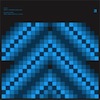 With Eleh having cemented themself as perhaps the modern minimalist, their split LPs have become a fascinating journey into the genre’s old guard such as Pauline Oliveros and Ellen Fullman as well as platforms for newer artists like Sun Circle, and in this case, Duane Pitre. As usual, Eleh’s hardcore analogue drones are well matched by Pitre’s feather-light just intonation harmonics. Both sides reflect different aspects of minimalism’s past without being pale shadows of those earlier pioneers. In fact, Eleh and Pitre demonstrate that despite a bloated market filled with crappy drone acts there is still plenty of life and room for invention in minimal music.
With Eleh having cemented themself as perhaps the modern minimalist, their split LPs have become a fascinating journey into the genre’s old guard such as Pauline Oliveros and Ellen Fullman as well as platforms for newer artists like Sun Circle, and in this case, Duane Pitre. As usual, Eleh’s hardcore analogue drones are well matched by Pitre’s feather-light just intonation harmonics. Both sides reflect different aspects of minimalism’s past without being pale shadows of those earlier pioneers. In fact, Eleh and Pitre demonstrate that despite a bloated market filled with crappy drone acts there is still plenty of life and room for invention in minimal music.
"Empty Summer Endless" at first seems like a return to the smooth, almost subsonic bass drones that Eleh had been exploring on their first few releases. However, occasional flutters of higher timbres and midrange tones reveal the continued experimentation with acoustics that have become more and more central to Eleh’s music. Time stands still as subtle and delicate waves gently disturb the air and Eleh’s music pacifies with its alien aesthetic. Eleh takes the same foundations as Eliane Radigue’s Trilogie de la Mort and constructs a miniature excursion into the void. There is little in the way of colour here, this is pitch black drift through the night sky.
Pitre’s side of the LP is the sound installation version of his work Feel Free (previously reviewed by our own Anthony D'Amico in April). In contrast to Eleh’s side, this is a kaleidoscopic excursion into harmonics as Pitre uses a scale in just intonation to form an almost living piece of music. Where Eleh moves in straight lines and gradients, Pitre moves in ever-changing vectors and discrete changes in spectra. A touchstone for this (aside from Pitre’s own albums) would be Catherine Christer Hennix’s Electric Harpsichord with its prismatic clusters of evolving patterns.
Compared to the album version of Feel Free (played by an ensemble), this software-driven variant should sound skeletal but, even reduced to just a computer generating patterns from sound files, Pitre’s work remains vibrant and really does feel free. Granted, the full sound from the main album is missing but here the precision and the clarity of the piece’s backbone are captured in sharp focus. It is dazzling and sounds both tremendously complex and deceptively simple at the same time, almost like a molecule of DNA. It is too bad this is not on CD as I would love to hit the repeat button and listen to it forever.
 
Read More

